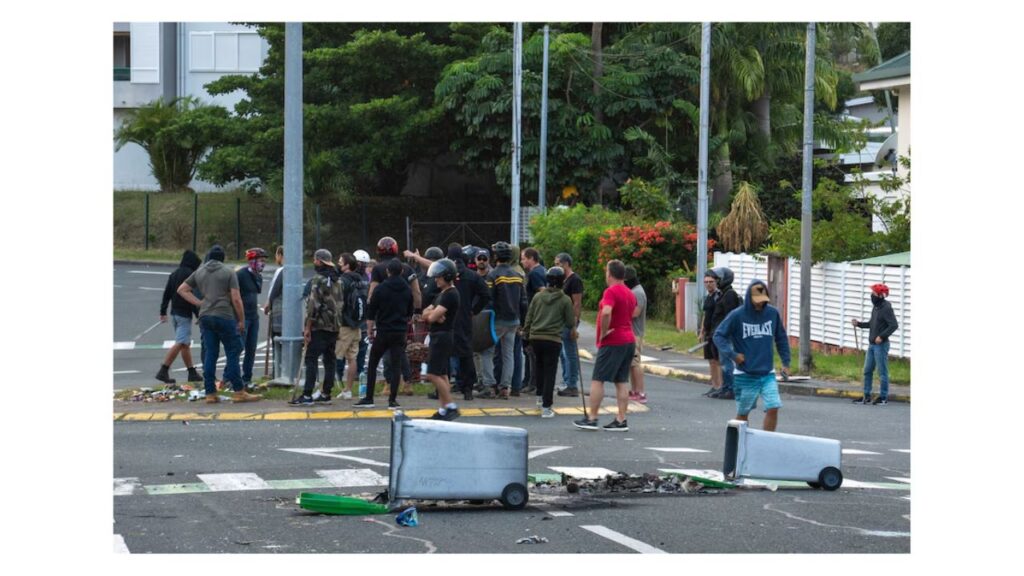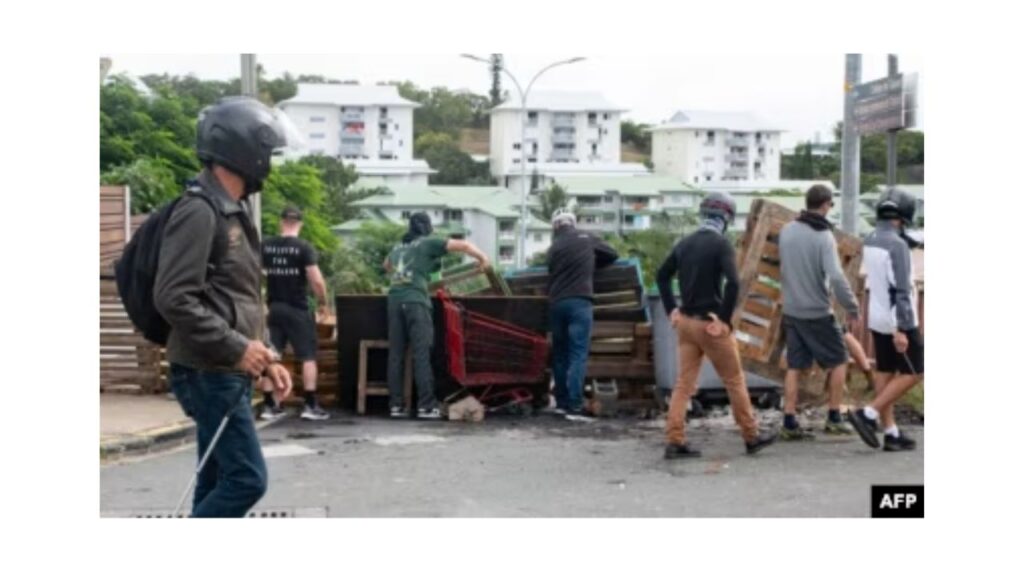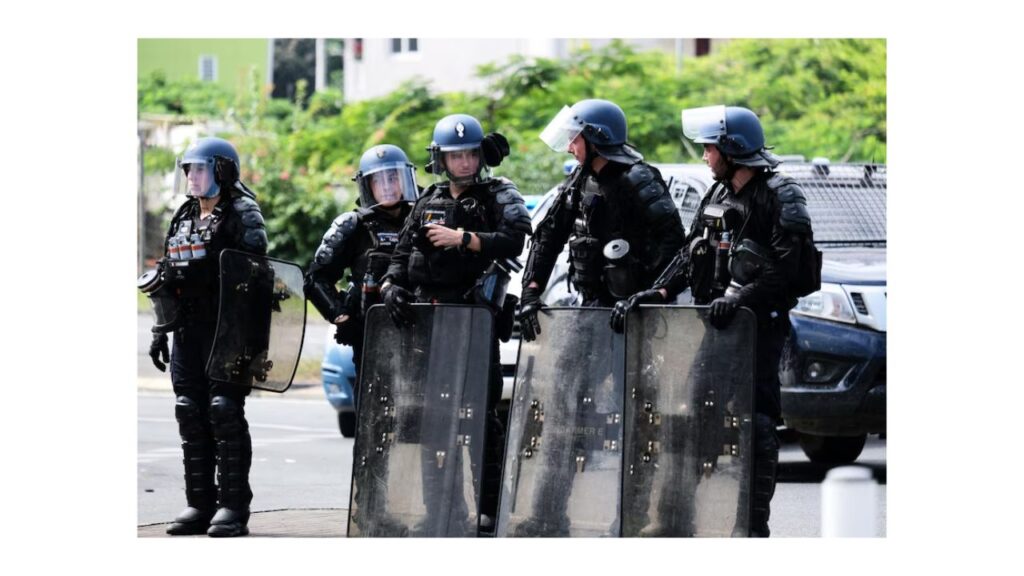In response to rioting over voting reform in the French-ruled archipelago, which claimed the lives of four people, including a police officer, France has proclaimed a state of emergency in the Pacific territory of New Caledonia.
The action was taken in response to the French government’s announcement that 500 more Gendarmerie and national police officers would be dispatched to the region in an effort to stem the violence.
Over the course of the 12-day state of emergency, authorities will have more authority to prohibit gatherings and restrict movement.
According to the Interior Ministry, France last enforced similar policies in New Caledonia, one of its overseas territories, in 1985.
In response to looting and vehicle and property destruction by rioters, more police were dispatched from France to supplement the 1,800 officers already on the scene.
As stated by French Prime Minister Gabriel Attal, the region had been “hit by violence of a rare intensity”.
Declaring a state of emergency “will allow us to roll out massive means to restore order,” he declared. “No violence will be tolerated.”
He declared that the goal of the state of emergency would be “to restore order in the shortest time possible” to the French parliament in Paris.

TikTok, a video app that the government has claimed assisted rioters in organizing and intensifying disturbances, has also been outlawed by the authorities.
Commenting was not immediately possible via TikTok.
In the capital Noumea, there is currently a curfew in effect from 6 p.m. to 6 a.m. and schools have been closed.
As of at least May 17, flights have been canceled out of the La Tontouta International Airport.
Three young Indigenous Kanak people had lost their lives in the rioting earlier on Wednesday, according to a spokesperson for President Louis Mapou of New Caledonia.
Subsequently, the French authorities declared that one of the police officials had been shot to death.
Gerald Darmanin, the interior minister of France, confirmed the 24-year-old’s passing on X and offered his condolences to his family.
Since Monday, over 300 people have been hurt and over 140 individuals have been arrested.
At least four suspected instigators were placed under house arrest on Thursday morning, the Reuters news agency said.
On Wednesday, masked protesters were spotted setting up temporary barricades while prowling the streets with rocks and golf clubs as weapons.
Locals said that cars and buildings were burning all across Noumea, and that demonstrators outnumbered the police.
What are the protests about?
A new bill that allows French citizens who have lived in New Caledonia for ten years to vote in provincial elections sparked riots on Tuesday. Some local officials worry that this will weaken the Kanak vote. The bill was approved by lawmakers in Paris.
In a decades-long struggle between Australia and Fiji about France’s role in the mineral-rich islands of the south-west Pacific, electoral reform is the most recent flashpoint.
The island was conquered by France in 1853, and in 1946 the colony was granted status as an overseas territory.
Movements in favor of independence have long shook it.
By laying out a plan for progressive autonomy and limiting voting to Indigenous Kanak and migrants who had arrived in New Caledonia prior to 1998, the 1998 Noumea Accord contributed to the end of the conflict.
Charlot Salwai, the prime minister of Vanuatu and the current chair of the Melanesian Spearhead Group, released a statement yesterday endorsing the Front de Libération Nationale Kanak et Socialiste (FLNKS), a significant pro-independence political organization.
“There’s an urgent need now for France to agree to the proposal by the FLNKS to establish a dialogue and mediation mission to be led by a mutually agreed high personality, to discuss a way forward so that normalcy can be restored quickly and an enduring peace can prevail,” the statement continued.
He went on to say “these events could have been avoided if the French Government had listened” .
“In its interactions with New Caledonia, the French government must adhere once again to the principles of the Noumea Accord.
“That spirit ensured respect and cooperation between all parties and ensured peace in New Caledonia.”
French President Emmanuel Macron and New Caledonian President Louis Mapou both called for calm in response to the most recent protests.
FLNKS accepted Mr. Macron’s offer to meet with both pro- and anti-independence parties prior to the bill’s official enactment.
According to the French government, the new voting regulations were necessary to ensure democratic elections.
‘Enormous disparities of wealth and power’
One in five people in New Caledonia, the third-largest nickel mining nation in the world, live below the poverty line as a result of the industry’s difficulties.
According to Henri, a thirty-year-old hotel employee in Noumea, “politicians have a huge share of responsibility”.
Kanak politicians disagree with loyalist politicians, who are descended from colonialists, who claim that colonization is ended. Significant economic gaps exist,” he stated.
Henri, who wished to remain anonymous, claimed that there was serious looting during the riots and that nighttime was the riskiest time to go.
A researcher and journalist in the Pacific islands, Nic Maclellan identified “enormous disparities of wealth and power” as one aspect of the current problem.
In New Caledonia, squatter settlements are home to thousands of people.
“You see that [is reflected] with young people out on the streets, torching Porsche cars and things like that.”

Mr. Maclellan continued, “The rejection of France as a colonial power was another factor that fueled the conflict.”
“Policymakers in Australia frequently refer to France as a Pacific country.
“However, New Caledonia’s neighbors in the Pacific Island Forum and Melanesian Spearhead Group frequently refer to it as a non-autonomous region, essentially a French colony.
“France is not a country in the Pacific; it is a European colonial power. Addressing the decolonization issue is necessary.
“That’s the key demand from Kanak people, who don’t want to be lectured about democratic rights when they are living under colonial administration.”
Australia wants to see an end to the political tensions that have fueled the riots, according to Foreign Minister Penny Wong.
“I would like to reiterate Australia’s request for calm.
“We appreciate and back the accord’s ongoing referendum process. We urge all stakeholders to collaborate in a positive manner to mold the institutional future of New Caledonia.”
Winston Peters, the Foreign Minister of New Zealand, urged all parties to engage in “constructive dialogue” and defuse tensions after postponing a trip to New Caledonia earlier this week owing to the turmoil.
“No matter your views on the political arrangements in New Caledonia, everyone should agree that violence is harmful to every community there,” he stated.
“New Zealand, as a neighbour of New Caledonia and fellow member of the Pacific Islands Forum, has a strong interest in the peaceful resolution of the situation there.”
Prime Minister of the Cook Islands and chair of the Pacific Islands Forum (PIF), Mark Brown, expressed that the events in New Caledonia were “deeply concerning to the Pacific family”.
In order to “find an agreed way forward that safeguards the interests of the people of New Caledonia,” he stated that the PIF was prepared to assist and offer a “supported and neutral space” for negotiations.
